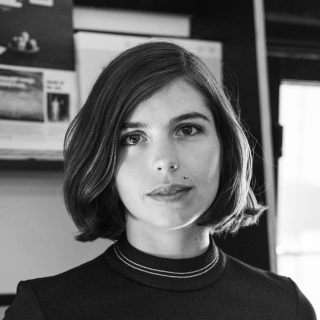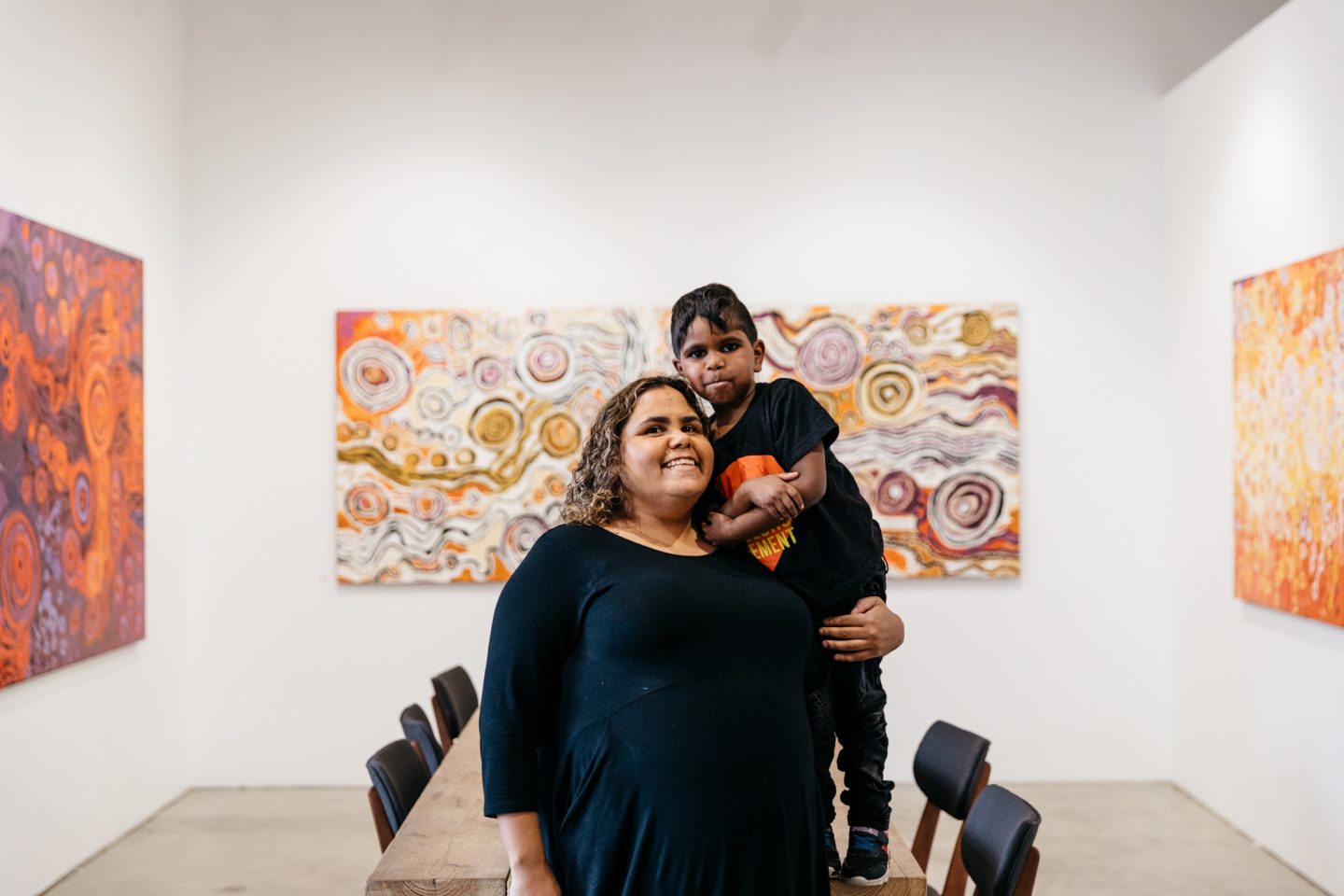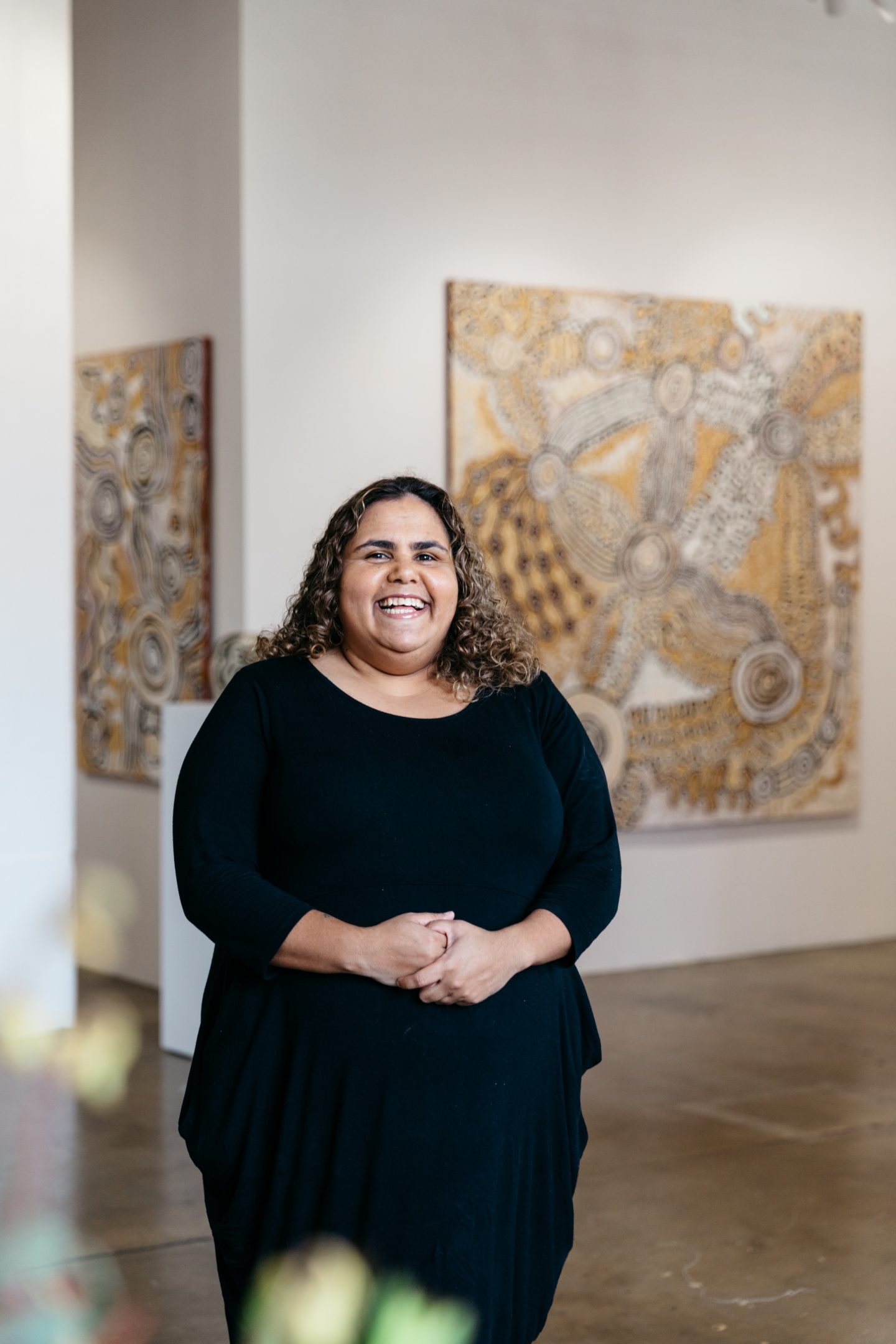
Farrin Foster
Farrin Foster is a journalist by trade, writer by ambition, and occasional film-maker by necessity. She lives and works on the sovereign lands of the Kaurna peoples.

Sally Scales is fast becoming one of the state’s most recognisable young leaders, but her rapid rise is fuelled by forces far more compelling than ambition or ego.
“People often ask, ‘Are they painting their Dreamtime?’” says Sally Scales seconds after beginning a tour of the Anangu Pitjantjatjara Yankunytjatjara (APY) Gallery in Adelaide.
“This notion of Dreamtime is so fickle. Dreamtime is something that’s made up. But this is our Tjukurpa – it’s our laws. And I’m not talking l-o-r-e. This is l-a-w. Why would you call it Dreamtime?”
Thirty-year-old Scales is at once forthright and fiercely friendly. This combination of traits has brought her naturally into the spotlight. The Pitjantjatjara woman is often heard making compelling arguments on the Q&A panel or calling out the “modern day slavery” of carpetbagging in national newspapers. But, unlike many young leaders, she is largely uninterested in her own opinions.
“Our elders are the ones kicking us up the bum,” she says with a laugh. “This is their voice and their vision. They have chosen me to speak and so I just think, let’s go.”
That sense of clarity has carried Scales through a tumultuous few years. In 2017, she was elected as deputy chair of the APY Lands Executive Board and worked on developing the Uluru Statement from the Heart. By 2019, she had become the youngest person ever to hold the role of APY Board Chairperson. In the same period, she became a mum – taking on full-time care of her now four-year old nephew Walter – while also being instrumental in opening two APY Art Centre Collective galleries in Sydney and Adelaide.
The COVID-19 pandemic followed swiftly on the heels of the Adelaide gallery opening, seeing Scales switch from brokering deals on behalf of artists to facilitating biosecurity measures to keep the virus out of APY communities.
“It really highlights the disparity between Aboriginal and non-Indigenous people – how wide that gap is in life expectancy, the instances of respiratory diseases, the low socioeconomic barrier which means you are exposed a lot more.”
Sally Scales
“It is scary,” she says. “It really highlights the disparity between Aboriginal and non-Indigenous people – how wide that gap is in life expectancy, the instances of respiratory diseases, the low socioeconomic barrier which means you are exposed a lot more.
“It has also shown the good, the bad, and the ugly of people. It showed how quickly government and organisations can act when they need to and it highlighted the complacency they have the rest of the time.”
Scales has recently moved permanently from her home community of Pipalyatjara to Adelaide to be more hands-on in the APY gallery and studio where more than 24 artists practice, and to support her mum who is in the city for health care.
Scales goes where her responsibilities take her, but holds no resentment. “It’s all perception,” she says. “It’s either looking at it going, ‘oh my God, this is such a heavy burden’, or thinking ‘this is a privilege and I will move with it in this way’.”
Leadership is a thread that runs through Scales’ life and family. Her parents met after her dad moved to the APY Lands in the 70s and began advocating for the establishment of art centres and investment in homeland communities.
His marriage to Scales’ mum, who would go on to lead the NPY Women’s Council for more than four years, could have been controversial. “It was an interracial marriage. There had been a few others, but my dad went through initiation – he was one of the first non-Indigenous men to go through that, so he was fully integrated into the community,” says Scales.
“A few weeks ago – it was very funny – we asked Mum what it was like, if people were talking, and she said, ‘I didn’t care – I just wanted him’.”
Her mum and dad were both significant childhood influences, even after they split when Scales was about five years old. After formative years spent at home in Pip, going out bush with family, and reading Phantom comics which she loved because “they’re all about the good triumphing over the bad”, she was educated in Alice Springs and Adelaide. Her parents ensured the time away from home didn’t diminish her connection to it.
“I am privileged that I still have my language and culture,” says Scales. “There are some Aboriginal people who don’t have that anymore.”
She retains this sense of perspective and self-aware optimism even when discussing issues that are tangled with profound grief and anger. On the Stolen Generations, while she says that “since Kevin Rudd said sorry, even more kids are being taken away”, Scales insists that more awareness and better policy can lead to positive change. When it comes to the Uluru Statement from the Heart, which has been repeatedly sidelined by government since its historic launch in 2017, she believes that people power can overcome political malaise.

“I won’t be the ‘angry Black woman’ … people don’t listen to the ‘angry Black woman’.”
The most recent challenge to Scales’ uncommon resilience is her move to Adelaide. Shifting to the city has seen her subjected to waves of political point scoring. From “supposed do-gooders” who deride artists earning a living working in the APY studio by saying they’re “just in it for the money” to watching better-funded organisations ignore the people they’re tasked with supporting, to weathering “personal attacks from those we’re trying to work with professionally”, Scales has experienced the worst of a small and tight-knit city.
It is the only topic on which she expresses a hint of frustration. “But I won’t be the ‘angry Black woman’,” says Scales. “People don’t listen to the ‘angry Black woman’.
“I work on behalf of Aboriginal people who are living in disadvantaged communities where the arts are some of the only real work people can have. The APY art centres are where there’s cross-generational teachings and people have the opportunity for financial independence.
“When you work for people who are living with disadvantage, you don’t stop. We’ll continue to do that whether we get the funding or not.”
Scales pushes on, deliberately replacing frustrated with friendly – approaching life with the strength and practicality of a person who is accountable to something far bigger than herself.

Farrin Foster is a journalist by trade, writer by ambition, and occasional film-maker by necessity. She lives and works on the sovereign lands of the Kaurna peoples.